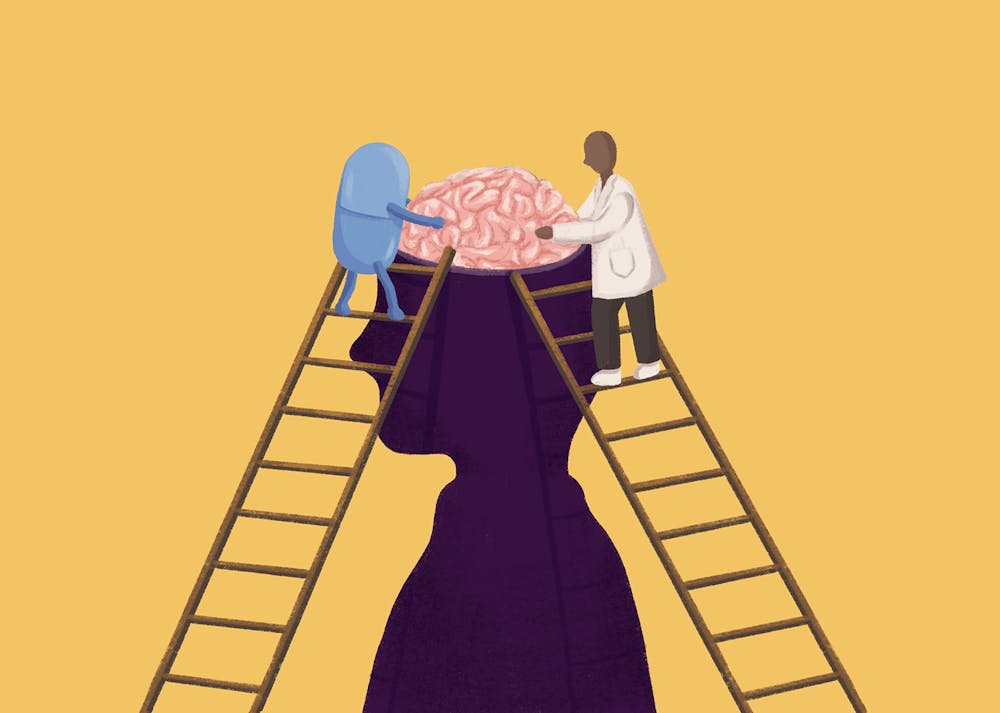I walked into the pharmacy with my mom. I told the worker my name and the prescription I came for. As the words left my mouth, heat crept up my face and my stomach tied itself in knots, a combination of excitement and anxiety washing over me. The pharmacy technician turned around to grab my order.
I shifted back and forth on my feet and looked at the ground.
My mental illnesses had become aggressive and blinding. My spark was gone, I was pale, malnourished and my personality had dwindled to almost nothing.
I was just a moving body.
The pharmacist handed me the paper bag of pill bottles. He looked me in the eye and told me to ignore the stigmas associated with what I held in my hand.
Everyone's brain is different, some of us just need extra help to get through life.
When I was 19, I began taking Zoloft and Abilify to manage my obsessive-compulsive disorder, anxiety, depression and anorexia nervosa.
But I had been dealing with my mental illness since junior high. And the long road to medication and stability was littered with stigma and fear.
And I wasn't alone. In 2019, the National Institute of Mental Health reported 51.5 million adults living with a mental illness. And many more remain undiagnosed and untreated because of the same stigmas that haunted me.
These unfair stereotypes placed on those living with mental illness leave many burdened with the decision to either get help and become categorized under that stigma, or not seek out treatment in an effort to detach themselves from it.
Before Being Diagnosed
In 2018, as a sophomore in college, I hit that point that felt like rock bottom. The best part of my day was 3 p.m., when I was done with the pain of going through the basic motions of day-to-day life and I could lay my head against my pillow. I wasn't enjoying life, I was simply obligated to it.
I removed myself from conversations. I wasn't eating. I was working out obsessively. I was irritable. But more than anything, I was feeling a sense of hopelessness that was so overwhelming I felt like I was drowning in it.
And finding a therapist that I was comfortable with was a painstaking process.
After a months-long search, I found the therapist that I am currently seeing. In my first session with her, I felt a flood of relief, like I could finally express what I was feeling to someone who could help me untangle the mess I thought I was.
The Diagnosis
After the first few sessions, my therapist diagnosed me with OCD, anxiety, depression and anorexia nervosa.
Hearing the first three disorders listed made sense to me, but when she told me I had anorexia nervosa, I was genuinely shocked. I didn't even notice it until she said the words out loud.
I was facing four very daunting diagnoses, each one with the capability to take over my life even more than it already had.
In those first few weeks, my therapist realized I was completely overrun by my mental illnesses and in order for me to do the work I needed to do to help myself in the long run, I needed the extra help psychiatric medications could provide.
Medication
My therapist referred me to a psychiatrist who I would meet with monthly to monitor any possible symptoms or issues from the prescribed medications.
I was prescribed low doses of Zoloft — a selective serotonin reuptake inhibitor that raises serotonin levels — and Abilify, which is labeled as an antipsychotic but was being used to help treat my eating disorder.
Even after I adjusted to the physical effects of the medications, I remember feeling the weight of societal stigmas surrounding psychiatric drugs and being worried about what side effects I may have from the medication or what my friends and family may think of it.
My concerns weren't unusual. Negative perceptions surrounding treatment for mental health disorders are common — whether that be in the form of therapy or just opening up about personal experiences.
A valuable lesson I learned in my experience was that I didn't have to feel trapped one way or another, I just needed to listen to my body and do what was best for my health, which can change. Maybe I'll have to be on medication for the rest of my life to manage my mental disorders. Maybe I won't. Either way, I will continue to do what I need to so I can live a peaceful life. I want this for anyone taking psychiatric medication.
Stigmas and Misconceptions
In a 2019 survey conducted by The Harris Poll on behalf of the American Psychological Association, it was found that 87% of Americans "agreed that having a mental health disorder is nothing to be ashamed of." But the survey showed that some stigma still persists. 33% of survey respondents said they agreed with the statement "people with mental health disorders scare me," and 39% said they would "view someone differently if they knew that person had a mental health disorder."
Marjorie Baldwin, a professor in the department of economics at ASU, studies workplace discrimination against people with disabilities — specifically those with a mental illness.
Baldwin said the stigma associated with mental illnesses is among the most severe, comparable to that expressed toward people with alcohol or drug abuse disorders.
"If someone is diagnosed with a mental illness, they are branded with the stereotypes that are associated with mental illness, and so you do everything you can to avoid that brand," she said. "And if you go to treatment, suddenly you've got a diagnosis and you become a person with a mental illness."
Baldwin said these stigmas infiltrate many parts of life. "In the workplace, discrimination can take the form of being ostracized socially, being harassed or bullied or, in the extreme, just losing your job completely."
But she said one of the worst consequences of the stereotypes surrounding mental illness is the self-stigma it creates.
"People who are diagnosed with a mental illness know the stereotypes that are pervasive in society, and many times they will adapt these stereotypes themselves, feeling that they're incompetent, incapable and a less valuable person," she said. "So to the extent that avoiding treatment can help you avoid the stigma — you can see why many people are hesitant."
When you take the step toward treatment, it requires self-admission that you may be dealing with a mental health disorder, and when these stigmas are so strong and negative, many people refuse treatment in order to avoid that self and social stigma.
Baldwin said the hesitation to seek out help is unfortunate because "in many cases, the sooner you get treatment, the more effective that treatment can be."
In addition, most people with a mental illness have experienced invalidation or dismissiveness from those they have opened up to. For anxiety, it's, "Just stop worrying." For depression, it's, "Just be happy, look on the bright side." For OCD, it's, "That doesn't make any sense, you shouldn't think so hard." For anorexia, it's, "Well, why don’t you just eat?" These statements and questions vary from person to person, disorder to disorder, but what remains the same is the complete misunderstanding and lack of consideration for those who deal with a mental illness.
Baldwin said there is a common misconception that mental illnesses aren't really a disease because of the lack of education surrounding mental illnesses.
"There's this idea that mental illness is not really an illness, that it's just somebody's weakness," she said. "So, education has tried to inform people that mental illnesses are real, that they are diseases of the brain, they are chemical imbalances of the brain."
Baldwin said even when this inaccurate belief is challenged, people then jump to another incorrect assumption that because mental illness is a disease of the brain, those who have a mental illness will never recover and will remain ill forever.
I may have felt hopeless when I first started treatment, but I wasn't. I am in a completely different and much better place now than I was two years ago. I may never "recover" in the way society feels I should, but I'm not broken. I needed help and I'm not ashamed of that.
Erasing the Stigma
The stigmas surrounding mental illnesses and the treatments that go with them, must be erased. There is a danger in these stereotypes because although some people may fear those with a mental illness, we are more of a danger to ourselves than others when we don't receive treatment.
Baldwin said stereotypes can be debunked when people with a mental illness directly challenge the stigmas placed upon them, by just leading their lives.
"I firmly believe that the stereotypes are debunked when people with mental illness who are in remission, in the workplace, in communities, (demonstrate) that they can be responsible," she said. "When people discover that (someone has) a mental illness and this person is a lawyer, a teacher, a professor, a businessman or whatever ... that's what changes people's minds."
Even with a mental illness — or four — I can lead a life just as successful as anyone else. My mental illnesses aren't shameful for me, not because they are easy to deal with — they certainly aren't — but because they are a part of me, and they don't make me any less capable.
Baldwin said when people open up about their personal experiences with mental health, it can be a powerful way to challenge the inaccurate notions the stigmas push, but noted how difficult that can be when the stigmas still persist.
We should all be able to talk openly about mental health. It's crucial to pay attention to and care for your mental health — to make it a priority. My hope is that people continue to be vulnerable and share their stories and continue to battle the stigmas.
Reach the reporter at bstoshne@asu.edu and follow @itsbrennaaaa on Twitter.
Like The State Press on Facebook and follow @statepress on Twitter.
Continue supporting student journalism and donate to The State Press today.




